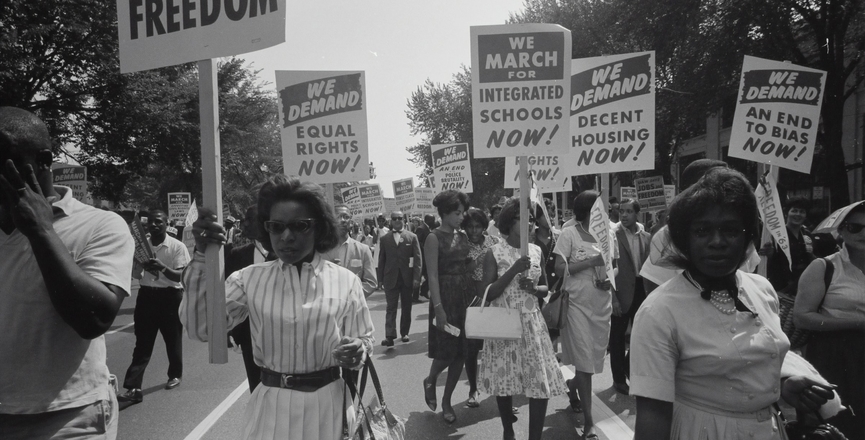Angela Davis — professor emerita at the University of California, Santa Cruz, an icon of African-American resistance to police oppression, and a critic of the U.S. prison-industrial complex — famously stated that it was not enough to be “non-racist”: citizens needed to embrace anti-racism.
Beginning in the U.S., a wave of effective protests around the world against racist police violence reveals an emerging consciousness about the necessity of doing more to eliminate anti-Black racism.
In Democracy in America (1835) Alexis de Tocqueville wrote that prejudice against Black people increased as they gained more rights. His observations turned out to be prophetic.
In the century after the American Civil War (1861-65) had formally ended slavery in the U.S., a de facto policy of separation of the races was imposed on Black Americans, in business, education, professions, employment, housing, hospitals, prisons and in the military.
The 1964 Civil Rights Act rushed through the U.S. Congress by president Lyndon B. Johnson after the assassination of John F. Kennedy, like the companion Voting Rights Act of 1965, was designed to end racial segregation, still very much in evidence in the territory of the old Confederacy.
The roots of institutional racism in the United States and racial discrimination throughout the Americas can be traced to the Atlantic slave trade and the plantation economies that flourished in the Caribbean, Brazil, Spanish America and the U.S. South.
In a series of research papers, brought together in a 2009 book, Lloyd Best and Kari Polanyi Levitt showed how the plantation economy based on slave labour and producing sugar, tobacco, indigo dyes, rice, cotton and other products for European markets persisted after emancipation of the slaves, and how it maintained the subjection of the formerly enslaved Black population.
The plantation economy operated as a form of industrial agriculture, harvesting raw materials and transforming them into commodities shipped to imperial centres, all from an enclosed hinterland ruled by slave masters.
The conditions of slave life were horrendous. Plantation slaves were beaten, whipped, branded, sexually assaulted, lynched and treated with every imaginable indignity.
On sugar plantations, slaves were worked to death. It was cheaper to bring in new slaves than to keep slave labourers alive.
Slave revolts and rebellions occurred throughout the period of Black enslavement in the U.S. Fear of escaped slaves led to active repression. If captured, escaped female slaves had their ears cut off; male slaves had a foot cut off.
Canadians can point with some pride to Chatham, Ontario, and other destinations on the underground railroad that transported Black Americans fleeing slavery to safety in Canada.
What also needs to be underlined is that Aboriginal and Black slavery were a feature of both Upper and Lower Canada. Indeed, until the British abolished slavery in the Empire, escaped Canadian slaves fled to New York and Ohio, which like other northern states, were free of slavery following the American Revolution.
The invention of the cotton gin (patented in 1794 by Eli Witney) led to the expansion of the U.S. plantation economy across the southern states. Nine American states joined the six states already practicing slavery, and the growth of the slave population exploded.
Cotton was the first American big business.
The suppression of the Atlantic slave trade by joint agreement of Great Britain and France in 1804 created an internal slave trade in the U.S., with slaves and their families being sold to meet the demand for cotton workers.
It was estimated that in 1860 one resident in three in the southern states was a slave.
The U.S. abolished slavery in 1865, and fuelling king cotton required modifying the plantation economy. So owners converted slaves into indentured labour.
Best and Levitt identified a fledgling residency economy, made up of freed slaves outside the confined plantation societies that continued to dominate agricultural production. However, as they pointed out, the plantation economy continued to operate until the 1930s Great Depression.
At that point the market for plantation products collapsed.
Overall, the plantation economy had stifled economic diversification and dynamism in the cotton and sugar producing areas of the Caribbean and the American South.
Violence against Black Americans was ingrained in the slave trade and the plantation economy. Social injustice and outright racial hatred were fuelled by groups like the Ku Klux Klan throughout the period of U.S. institutional racism in the century after the Civil War ended.
The post-1945 flourishing of the anti-colonial movement in the Caribbean and the civil rights movement in the U.S. were each linked to the desire to break with the life of oppression inherent in both slave labour and indentured labour in commodity production.
By the 1960s, the U.S. civil rights movement was convincing more and more Americans that Black people deserved to live free, according to the principles of the U.S. Declaration of Independence.
Martin Luther King, Jr. and other Christian leaders preaching inter-racial peace and practicing non-violent protest brought together an imposing inter-racial alliance for civil rights and social justice. Its legacy remains influential to this day.
Behind his 1968 Southern strategy, Republican Richard Nixon was elected U.S. president.
In the ensuing 50 plus years, other Republican politicians, particularly in the South, opted to play to the substantial minority of U.S. citizens that resisted the ideals of racial equality. Voter suppression, campaign contributions and other forms of racial politics have had an impact on policing and criminal justice.
Last week in Washington D.C., at a rally condemning the murder of George Floyd and police violence, protestors sang Lean on Me with the lyrics “I’ll be your friend … “
“Socius” is the Latin word for friend, and the root word for socialism.
Duncan Cameron is president emeritus of rabble.ca and writes a weekly column on politics and current affairs.
Image: Library of Congress/Unsplash




